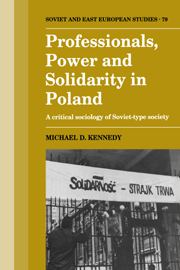Book contents
- Frontmatter
- Contents
- List of tables
- Acknowledgments
- List of abbreviations
- Introduction
- PART I SOLIDARITY AND SOCIAL TRANSFORMATION
- PART II SOLIDARITY AND THE THEORY OF SOVIET-TYPE SOCIETY
- 4 Solidarity, modernization and class
- 5 Solidarity, culture and civil society
- 6 A theory of power relations in Soviet-type society
- PART III PROFESSIONALS AND SOLIDARITY
- PART IV CONCLUSION
- Notes
- References
- Index
- Soviet and East European Studies
4 - Solidarity, modernization and class
Published online by Cambridge University Press: 22 September 2009
- Frontmatter
- Contents
- List of tables
- Acknowledgments
- List of abbreviations
- Introduction
- PART I SOLIDARITY AND SOCIAL TRANSFORMATION
- PART II SOLIDARITY AND THE THEORY OF SOVIET-TYPE SOCIETY
- 4 Solidarity, modernization and class
- 5 Solidarity, culture and civil society
- 6 A theory of power relations in Soviet-type society
- PART III PROFESSIONALS AND SOLIDARITY
- PART IV CONCLUSION
- Notes
- References
- Index
- Soviet and East European Studies
Summary
T. Anthony Jones (1984) identifies three basic approaches to the study of Soviet-type society: the political–economic, the political and the industrial. Jones advocates the industrial model within a general modernization approach and evaluates models on the degree to which they facilitate the comparison of societies. His analysis overstates the unity in political and political–economic models, but this classification of approaches nevertheless serves as a useful point of departure for this overview. In what follows, I consider the relevance of modernization theory for understanding Solidarity and developing a critical sociology of Soviet–type society. I then turn to a more extended analysis and critique of various political–economic approaches. I conclude this chapter with a review of the strengths and weaknesses of these approaches. In the following chapter I consider whether the “political” models of totalitarianism and civil society overcome the limitations of the political–economic models.
Industrialism, functionalism and normative commitments
Jones (1984) finds the industrial–society model superior to the political and political–economic models he considers because it opens the way for a dynamic analysis of these societies and their comparison with other societies with similarly developed technological bases. The common tendency for all industrial societies to become increasingly complex with technological development serves, for him, as a useful point of departure for sociological analysis (Jones, 1976). It provides a dynamic approach and directs analysts to problems of social structure, unlike the political and political–economic models which focus on politics and class respectively.
- Type
- Chapter
- Information
- Professionals, Power and Solidarity in PolandA Critical Sociology of Soviet-Type Society, pp. 121 - 160Publisher: Cambridge University PressPrint publication year: 1991



